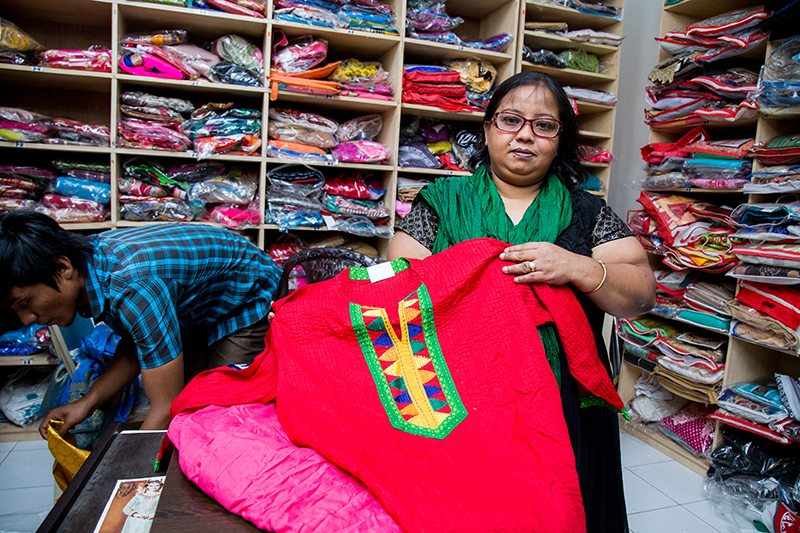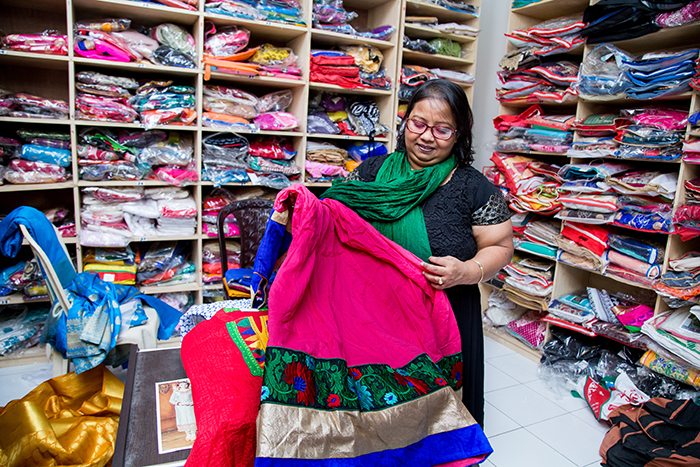
This story is made possible in part by our friends at IDLC Finance Limited. IDLC helps SME entrepreneurs to focus on their business and grow by ensuring smooth financing and other supports. Learn more about IDLC SME Loan here
Owner and CEO of Mensen Media, Tauhida Haider Reema, reflects on her serendipitous journey into the world of business, her love for crafts and painting, her e-commerce venture Mensen Media, challenges of doing business and her lessons for other women entrepreneurs.
Please tell us about yourself. How did you end up doing this business?
I have been painting since my early childhood. I used to attend Shishu Academy when I was a kid. Color is one of the things that attracts me a lot. I love to play with color, combining two different colors and seeing a new one come into being. I enjoy this amazing form of creation.
During my time at University, back in 2001, I used to paint a lot and attend exhibitions. In one such exhibition, I managed to sell 3 of my paintings for a total BDT 15 thousand. That’s when some of the people who recognized my work asked me to apply my paintings and designs on clothes, particularly on sharees. And that’s how I got into the clothing business.
In 2002, I started experimenting with hand painting on local clothes. I used to bring sharees from Tangail and hand paint on them and sell those to a few clients. I had a few regular clients who would place orders in advance. I named my work as “Achole aamar desh” which was mainly my hand painting on Tangail sharees.
Afterward, I got married in 2009. My husband is a computer engineer and has his own company named Global Web Outsourcing. I used to work with him and was doing my painting work on a limited scale on the side. By then, I started to put photos of my work on Facebook and then I started to get orders online.
In our first anniversary, my husband gifted me a trade license named Mensen Media. That’s how this company formally started. Mensen Media is a dutch word for “For Humanity”.
I was incredibly inspired after that, I’m grateful to my husband, and started to think how I could expand my work and grow my business. That’s when I started to put more effort on Facebook. Initially, the response was not that great but gradually it started to grow and a steady stream of orders continued to come. Later I started some branding work and added some more products.
During my time at University, back in 2001, I used to paint a lot and attend exhibitions. In one such exhibition, I managed to sell 3 of my paintings for a total BDT 15 thousand. That’s when some of the people who recognized my work asked me to apply my paintings and designs on clothes, particularly on sharees. And that’s how I got into the clothing business.
What are the products you offering now?
Sharees, Salwar kameez, Kurti, and beauty products comprise the majority of my offerings. Almost everything we offer is handmade and an in-house production. Besides, we also offer Panjabi and special collections on different occasions.
In addition to that around 3% of my products are made by craftspeople. For example, I resell Nakshi Katha from expert makers from Jamalpur and Jessore. I pay them upfront when taking the product so that they don't get into a liquidity crisis.
On an average, our revenue stands at around 12-15 lac taka per month. We are currently a team of 7 people and are in the process of hiring 10 more people.
Who are your target customers? How do you market and distribute your products?
My target customers are people who want innovative and unique products. Most of my handcrafted products are loved by high-end customers, some of whom are Non-Resident Bangladeshis [NRBs]. My hand painted sharees are customized according to individual needs and are mostly for my regular clients.
Facebook is the biggest distribution channel for us so far but we are also working on our website. That said, we sell offline as well: in both wholesale and retail. We attend fairs round the year.
Once a product is ready, we do in-house photography using professional models and then post them online. Many customers then call us to know more details about the products. We give them time to understand and sometimes I even talk to them for 15 minutes.
When we receive an order, we deliver the products through third party courier. We have third party delivery partners: SA Paribahan and Sundarban for outside Dhaka. In Dhaka, we also use a host of new services. Logistics is an indeed quite a big problem for small e-commerce services in Dhaka.
I used to work with several other small-scale logistics services and got dissatisfied with their service. I even tried my own delivery chain with 10 people and 10 bicycles which I had to shut down as managing them became a problem.
We work harder in order to build lasting relationships with our customers. Sometimes, we send them small gifts with our products and also greetings on different occasions.
In 2002, I started experimenting with hand painting on local clothes. I used to bring sharees from Tangail and hand paint on them and sell those to a few clients. I had a few regular clients who would place orders in advance. I named my work as “Achole aamar desh” which was mainly my hand painting on Tangail sharees.

Tell us about challenges you face as an entrepreneur?
Marketing has been a problem since the beginning. We spend quite a good amount of money on Facebook which brings sales to some extent, but that is not sustainable.
There is an unhealthy competition in women's’ product businesses online. A lot of people are trying similar things and using the price as a competitive advantage which causes problems for us.
As I said, logistics is a serious problem. Since we depend on the third party partners, we can’t control that part of the experience which complicates our relationship with the customers. Moreover, in the case of cash on delivery, receiving payment is a challenge. I found courier service providers to be very unprofessional in my initial years. Fortunately, now things are getting better.
Trust is a huge issue in e-commerce. Customers order products only by seeing product image and sometimes may feel deceived after receiving the goods. We maintain a straightforward return policy, you can return our products if you don’t like it with no questions asked. This way customers feel safe buying from us. Building trust is of paramount importance to us.
When did you take your SME Loan from IDLC? How Is Your Experience?
After nearly 3 years of starting Mensen Media, I took an SME loan from IDLC to further expand my business. I have been with them for the last 15 months and I am happy with their services. They are very sincere about offering their services and help.
We work harder in order to build lasting relationships with our customers. Sometimes, we send them small gifts with our products and also greetings on different occasions.
Do you have a role model or someone you look up to for inspiration?
From the very beginning of my life, my father has been my mentor and inspiration. We are a business-minded family. My father was in textile business.
He taught me the nitty-gritty of business. Secondly, my husband always pushed me to move forward. By gifting me the trade license of Mensen media, he gave me the best kind of motivation and honor.
Lessons that you want to share with other fellow entrepreneurs.
Girls often get confused about career, whether to do a job or start a business and sometimes try to do both which is detrimental. In life, you have to make a decision and stick to it. If you want to do business, do it.
If you want to pursue another career, do it wholeheartedly. And if you are doing business, there will be good times and bad times but you have to stick to your course in order to achieve your goal.
Study and understand the market before you dive in. You must know every detail about your product and business. And finally, whatever business you are in, do leverage the power of technology.
